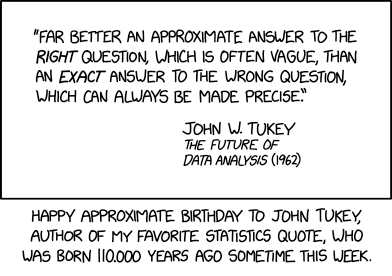Tukey

Numbers can be tricky. On the day of my 110th birthday, I'll be one day younger than John Tukey was on his.

Numbers can be tricky. On the day of my 110th birthday, I'll be one day younger than John Tukey was on his.
The comic gives a quote by John W. Tukey, an American mathematician and statistician, from his paper called The Future of Data Analysis, where he discusses the importance of facing uncertainty. A stripped-down version of his quote could be formulated as:
It is far better to have an approximate answer to the right question than an exact answer to the wrong question.Randall then gives Tukey's age as 110.000 years (that is, 110 years to three decimal places) — a very precise answer to the question of "how old is Tukey?" However, when it comes to his birthday, arguably the right question in this context, he only gives the approximate answer of "sometime this week". Tukey was born on Wednesday, June 16, 1915, 110 years and 2 days before the release of this comic on Wednesday, June 18, 2025. Since he died in 2000, it can be debated whether he has a birthday this week!
Since the comic was two days (or 0.54% of a year) late compared to Tukey's actual birthday, three decimal places of zero is actually inaccurate on the day of the comic's release, when he was 110.005 years old. However, sometime during that week he was exactly 110.000 years old — the joke being that he gives a very precise age, but not the exact time when this answer was accurate.
The title text states that Randall would be one day younger than Tukey would be on his 110th birthday. Tukey's 110th birthday (on Monday) marked 40,178 days since his birth. Randall's 110th birthday (2094-10-17) will occur 40,177 days after his birth, due to having only passed through 27 leap-days (the first in 1988, the latest in 2092) instead of Tukey's 28 instances (from 1916 to 2024, inclusive).
There are multiple different definitions of the year, however. The one most applied to birthdays is "a whole year has passed when it's the same calendar day", but the usual scientific/mathematical value is the tropical year of 365.2422 days (the time between the same two equinoxes) which smears the leap day across four years (which might impact the last digit of the calculation), and also the sidereal year of 365.2564 days (the time it takes the Sun to return to the same place in the sky), which differs due to precession of the equinoxes. The difference between the tropical and sidereal calculations over 110 years is about 1.5 days, so for this alternative definition of the year, we get a different answer for which day is 110, but it still remains "this week". There's also the average length of a year in the Gregorian calendar (the calendar in use now), which averages 365.2425 days over the 400-year cycle of the calendar. Tukey suggests we shouldn't get hung up on this, but those who happen to be born on 29th February may disagree.